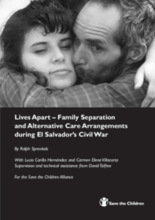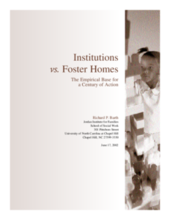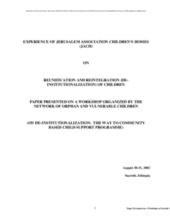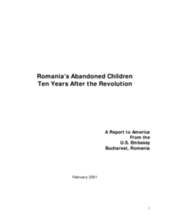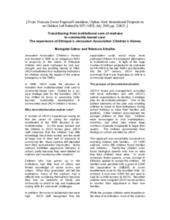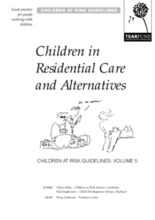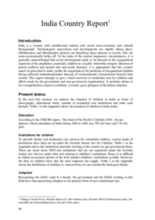Displaying 651 - 660 of 678
A statement, by UNICEF for the Stockholm Conference on Residential Care, which recommends a move away from institutional care for children and offers the ‘protective environment’ framework as a solution which encourages protective legislations and policies, public debate, government commitment and the need to listen to the children. The statement includes lessons learned about the issue of children without family care and recommendations for reform.
This report details the situation of disappearing children during the El Salvadorian civil war. It describes the process of tracing and reunifying children with their families, as well as alternative care arrangements for separated children.
A review of institutional care and family-centered care with a discussion of both positive and negative aspects of group care. This review paper is primarily focused on showing the inefficacy of group care and recommending other forms of care such as kinship care and even foster care as options that are more cost effective and better for children’s development.
This paper provides a guideline for the implementation of reunification and reintegration programs for agencies providing institutional care for orphans. It outlines the different strategies and activities an organization in Ethiopia used to transition from institutional care to community-based childcare projects.
An account of the massive child welfare crisis in Romania which erupted from a movement in Romania during its communist regime to institutionalize thousands of children. This paper also reports the efforts of NGO’s, PVO’s and the international communities to reverse the damage after the fall of communism and also where the efforts need to be directed.
Country report of China on the situation of children in residential care in anticipation of the Second International Conference on Children and Residential Care: New Strategies for a New Millennium, to be held in Stockholm 12 – 15 May 2003.
An account of Jerusalem Association Children’s Homes’ work involving deinstitutionalization of orphaned children in Ethiopia. The report is a summary of the steps taken by this organization to reunify/reintegrate the children into their families and society and some next steps are also mentioned.
A series that provides a framework for good practice and guidelines for those who work in the area of child development policy. The series delves particularly into residential care and other alternatives of care and makes suggestions for reform by evaluating 6 case studies of good practice examples.
Country report of India on the situation of children in residential care in anticipation of the Second International Conference on Children and Residential Care: New Strategies for a New Millennium, to be held in Stockholm 12 – 15 May 2003.
The purpose of this report is to document the levels of child abandonment and de-institutionalization as an indicator of the quality of social transformation during the transition decade (1990-2000).

